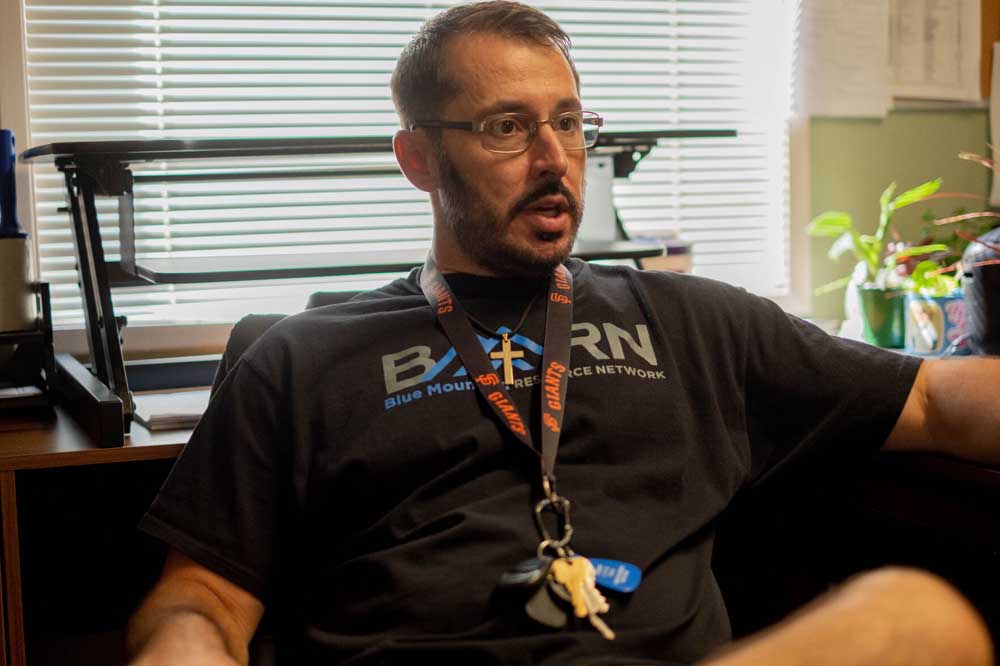A spark of hope for those in substance abuse recovery
Published 4:00 pm Wednesday, August 2, 2023

- Jesse Moore, peer mentor of Eastern Oregon Recovery Center, Pendleton, talks , July 7, 2023, about the help he provides when he visits Eastern Oregon Correctional Institution, the medium-security state prison in Pendleton.
PENDLETON — Rob Brown is on a mission to help more Eastern Oregonians struggling with addiction to get the help they need.
Brown said the biggest obstacle for people getting help is a lack of knowledge and understanding of resources. Key to overcoming those hurdles is spreading the word about the value of peer mentors.
“People don’t know where to go,” Brown said. “People don’t know what resources they need because it can all be messy and overwhelming, and that’s why peer mentors are so important. They provide some stability through the process.”
Brown is the peer supervisor of the Eastern Oregon Recovery Center and the Blue Mountain Resource Network out of Pendleton, which since August 2022 has been leading the local effort to fulfill the promise of Oregon Ballot Measure 110 to combat drug addiction and overdoses using health-based, community-based, more cost-effective services for those struggling with substance use disorder.
He works with three certified peer recovery mentors, each with the capacity to oversee a caseload of 25 people, altogether being able to service 75 in the community at any given time. Brown estimated the network is servicing about 60 people and he said he expects it will go up toward maximum capacity soon, but numbers fluctuate.
“The recovery mentors go out into the community and let people know that resources are available,” Brown said, “and then the mentor follows them through the whole process, from street life to detox and treatment, release from treatment, transitional living. And we work with someone in recovery until they say they no longer want services.”
Floundering at start of Measure 110
The Blue Mountain Resource Network operates 24 hours a day, seven days a week, providing screening, intervention, substance use disorder treatment and addiction recovery services, peer services, housing and supported employment. The program also supports the development of life skills, such as personal hygiene, cooking, cleaning and shopping.
The work the network is doing comes out of Measure 110, the Drug Addiction Treatment and Recovery Act, which reduced the penalty for possessing small amounts of illegal drugs and established Behavioral Health Resource Networks through the Oregon Health Authority. Oregon voters in November 2020 passed the measure by about a 17% margin. Voters in most rural counties, however, rejected the measure, including Umatilla and Morrow counties, where it failed by about 56% to 44% and by about 60% to 40%. Local law enforcement has been vocal that Measure 110 has been a failure.
Brown acknowledged the services Measure 110 provided had a poor rollout across the state. It is controversial and frustrating, he said, and the money was not there at the beginning.
“I think that they sometimes have more resources on the other side of the state,” Brown said, “and they don’t always consider the full, entire state. It took a while, some time to get money dispersed through the OHA.”
But Brown said he now feels Eastern Oregon Recovery Center and the Blue Mountain Resource Network have their feet underneath them and are now helping the people Measure 110 intended to help.
Meeting people where they are
Alyssa Bracken, a peer recovery mentor. She said she wants people to realize it is possible to overcome and recover from substance use.
“You have potential,” she said. “You have a lot to offer. You have worth. You are beautiful. You are smart.”
A lot of people haven’t been told that, she said.
“A lot of people are homeless and hopeless but a person’s life can be turned around,” she said. “We are here to help people get over barriers, get treatment, get jobs and live on their own.”
“We provide transportation,” Brown said. “We can help speed the process up, like when getting a driver’s license, because some things just take a long time and have so many different steps.”
Bracken said drug use often stems from past trauma, and substance use provides a form of escape or suppression of that trauma.
“And then it just snowballs into this thing and they don’t know what to do,” she said. “It can be scary.”
There is fear of reliving past trauma if someone quits using, she said. And there also is fear of withdrawal. It can be terrible.
“It can be very defeating for people,” Brown said. “So we can help with self-esteem, whatever we can to reduce the risk of relapse.”
“We reach out our hand, and we provide people details on services and we provide contact information,” she said. “We want to be with them by their side, too, as they go through the process of recovery. People don’t want to live like this, so we are doing everything we can to provide them the opportunity to change and improve their lives.”
Jesse Moore, another peer recovery mentor, has been going directly into the Umatilla County Jail, Pendleton, and signing people up for services.
“I can see the hope in their eyes when they realize they have resources awaiting them,” he said. “They have a spark of hope instead of just hitting back to the streets and being addicted, being homeless.”
He said it helps to be there when someone gets out of jail and take them straight off to where they need to go to get services. Eliminating the window of time after getting out of jail increases the chances of someone following through with their recovery.
Knocking back the stigma
Brown said another barrier that prevents people from getting the help they need is simply the stigma attached to receiving such services. The Blue Mountain Resource Network on July 8 participated in the Break the Stigma Event at Roy Raley Park.
The event was a collaboration between multiple community organizations with the goal of breaking down barriers, tackling misconceptions and creating a compassionate environment for mental and behavioral health services.
Another similar event — Unity in the Community — is being planned for September.
Brown said he wants people to reach out, and the Blue Mountain Resource Network is here for them. His message boils down to four words:
“You are not alone.”
Blue Mountain Resource Network is here to help. If you or a loved one or just someone you know is struggling with substance use disorder, don’t hesitate to contact the Blue Mountain Resource Network by calling 877-286-2676.






